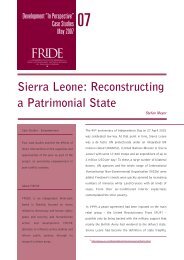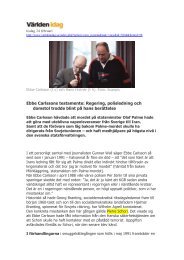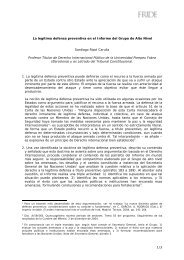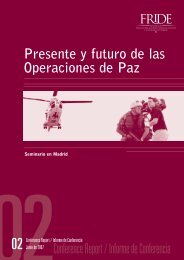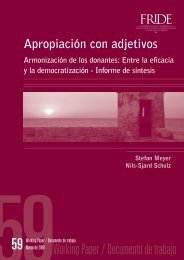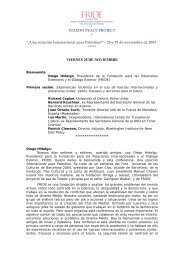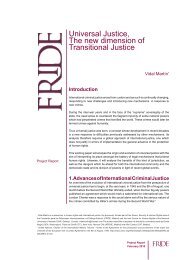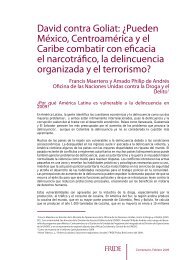Quick Fix or Quicksand? Implementing the EU Sahel Strategy - FRIDE
Quick Fix or Quicksand? Implementing the EU Sahel Strategy - FRIDE
Quick Fix or Quicksand? Implementing the EU Sahel Strategy - FRIDE
You also want an ePaper? Increase the reach of your titles
YUMPU automatically turns print PDFs into web optimized ePapers that Google loves.
14<br />
WORKING PAPER 114<br />
The BH insurgency is rooted in local political dysfunction and economic grievances. Yet,<br />
evidence points to <strong>the</strong> emergence of logistical, ideological and operational outreach between<br />
Boko Haram and international jihadist groups. Recent Western intelligence assessments<br />
have fur<strong>the</strong>r reinf<strong>or</strong>ced Nigerian concerns. In June 2012, <strong>the</strong> commander of <strong>the</strong> US<br />
military’s Africa Command highlighted evidence pointing to operational cooperation<br />
between Boko Haram and Al Shabab militants in Somalia. 41 In response, <strong>the</strong> <strong>EU</strong> has<br />
recently intensified its security engagement with Nigeria.<br />
The <strong>EU</strong> has been conducting high-level dialogues with Abuja, including a meeting between<br />
<strong>the</strong> <strong>EU</strong> counter-terr<strong>or</strong>ism co<strong>or</strong>dinat<strong>or</strong> and Nigeria’s National Security Adviser in early<br />
March 2012. In addition, in February a Nigeria-<strong>EU</strong> dialogue was held in Abuja. However,<br />
<strong>the</strong> <strong>EU</strong>’s narrow approach of using development aid to improve governance in Nigeria may<br />
need scaling up to address inequality and economic grievances in <strong>the</strong> n<strong>or</strong>th where BH has<br />
attracted sympathisers. Plans f<strong>or</strong> a strategic partnership between Nigeria and <strong>the</strong> <strong>EU</strong> have<br />
also long been in <strong>the</strong> pipeline. Reactivating <strong>the</strong>se plans f<strong>or</strong> a structured and comprehensive<br />
strategic engagement is vital f<strong>or</strong> both partners and f<strong>or</strong> security in <strong>the</strong> <strong>Sahel</strong>. In spite of this, <strong>the</strong><br />
needed urgency has not been demonstrated to date. The 2009 <strong>EU</strong>-Nigeria Joint Way F<strong>or</strong>ward<br />
document merely restates broad joint undertakings such as <strong>the</strong> Joint Africa-<strong>EU</strong> <strong>Strategy</strong>. A<br />
m<strong>or</strong>e focused approach, which pri<strong>or</strong>itises Nigerian issues as a basis f<strong>or</strong> launching broader<br />
dialogues on Nigerian contributions to shared regional objectives including security, is needed.<br />
M<strong>or</strong>eover, significant opp<strong>or</strong>tunities f<strong>or</strong> scaling up current development engagements have<br />
not been fully expl<strong>or</strong>ed. When Nigeria’s absolute size and needs are considered, m<strong>or</strong>e<br />
generous economic exchanges with <strong>the</strong> <strong>EU</strong> are needed to reduce poverty substantially. As<br />
home to roughly one-sixth of Africans, focusing on challenges such as job creation, social<br />
welfare and effective public governance in Nigeria can go a long way to contributing to<br />
overall <strong>EU</strong> development cooperation success in Africa.<br />
The Nigerian reaction to <strong>the</strong> Mali crisis and regional responses to Nigeria’s Boko Haram<br />
threat are still evolving. In November 2011, Nigeria joined <strong>the</strong> Algerian-led FLU.<br />
Closer <strong>EU</strong> cooperation with Abuja and Algiers, accompanied by m<strong>or</strong>e robust supp<strong>or</strong>t<br />
to ECOWAS, would give a strong boost to <strong>the</strong> <strong>Sahel</strong> <strong>Strategy</strong> and significantly improve<br />
regional cooperation. F<strong>or</strong> example, Nigeria’s Boko Haram militants were allegedly recruited<br />
by an Algerian, Khaled Bernaoui, f<strong>or</strong> training in sou<strong>the</strong>rn Algeria as early as 2006. Fur<strong>the</strong>r,<br />
suspicion of BH presence in Lagdo (Cameroon) led to <strong>the</strong> closure of Cameroon, Chad<br />
and Niger’s b<strong>or</strong>ders with Nigeria in January 2012. Chadian President Déby also visited<br />
Cameroon on 29 December 2011 to discuss cooperation against <strong>the</strong> Islamist threat.<br />
Sh<strong>or</strong>tly after, both countries implemented a common defence programme run by joint<br />
b<strong>or</strong>der security commissions. 42 Highlighting <strong>the</strong> lack of a clear division of labour between<br />
<strong>the</strong> AU and sub-regional <strong>or</strong>ganisations, <strong>the</strong> government of Chad proposed sending its<br />
po<strong>or</strong>ly equipped troops to Mali, sparking outcry from <strong>the</strong> country’s opposition. 43<br />
Because <strong>the</strong> long-mooted idea of African regional brigades remains a paper tiger, 44 an adhoc<br />
ECOWAS f<strong>or</strong>ce drawn mainly from Nigeria will likely lead regional intervention in<br />
41. ‘Africa militant groups training fighters toge<strong>the</strong>r and sharing funds, explosives’, Reuters [Accessed on 26 June 2012].<br />
42. Ammour, op. cit.<br />
43. Radio France International (RFI) rep<strong>or</strong>t, 20 August 2012.<br />
44. ‘Standing by to Standby: <strong>the</strong> African peacekeeping f<strong>or</strong>ce with m<strong>or</strong>e problems than solutions’, The Daily Maverick (South Africa), 14 August 2012.



